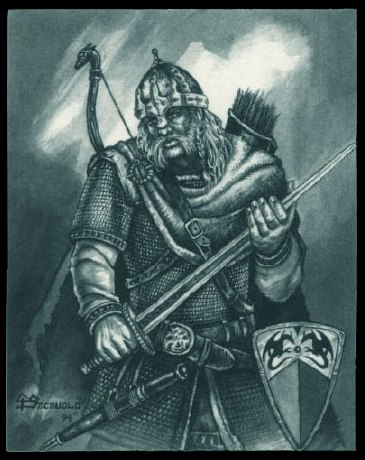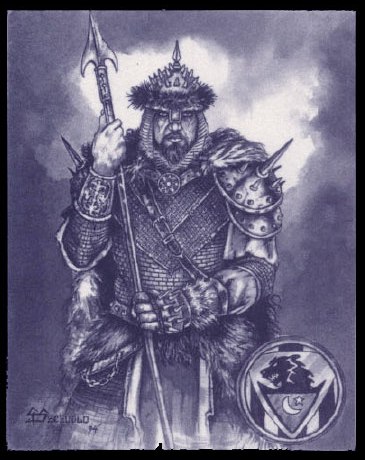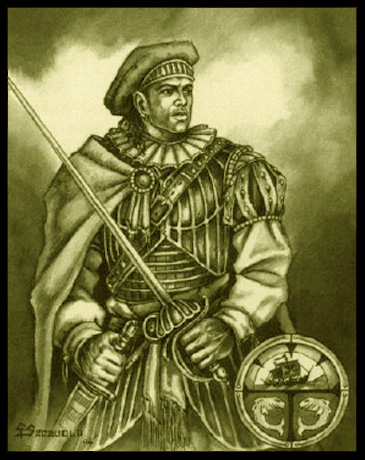The primary races of the Himinndyrr setting are typical for most any Fantasy based game-worlds: Humans, Elves and Half-Elves, Halflings, Dwarves. However, there are some differences between the races presented here and those in other campaign settings. Also, non-human races do not exist in the variation that they exist in other settings. That is, there are no Wood Elves, High Elves, Gray Elves, etc.
Humans are split into five distinct subraces, each representing a different culture:
'¢ Anuirean - The human descendants of the Andu tribe. After fleeing the corruption of ancient Adurian civilization by the god Azrai, the Andu were brought to Cerilia by their patron god Anduiras. When the old gods died at the battle of Mount Deismaar, the newly risen god Haelyn became their patron god. Haelyn's brother Roele founded the Aniurean Empire, which at one time encompassed major portions of Rjurik, Brechtur, Khinasi, and all of Anuire. That empire lasted some thousand years until Michael Roele, the last Emperor of Anuire, died at the hands of the Gorgon, heralding its decline. The subject realms subsequently won their independence and the twelve Duchies of Anuire fractured politically. Currently some thirty separate realms exist in Anuire. Most are human dominated, but a few goblin, elven, and dwarven realms exist as well. Anuireans are culturally similar to medieval western Europe. Feudal lords hold dominion, armored knights fill the military, and a small middle class of merchants chaffes under the rigid social structure. As Anuire was the region described in the original boxed set and is closest to established fantasy stereotypes, it is perhaps the most well known and heavily played region of Cerilia.
'¢ Brecht - The Brecht humans tend to be individualistic and enterprising. They have a large middle class and merchant-princes hold much power. The Brecht are superb sailors, voyaging far and wide to trade. They depend upon their fleets and rugged mountains to defend their coastal realms. Their patron god is Sera, goddess of trade and luck. The Brecht draw elements from Renaissance Spain, Italy, the Netherlands and Germany, as well as the Hanseatic League. Piracy is a major problem, daring captains sail roundships to distant continents, and much swashbuckling ensues.
'¢Khinasi - Khinasi lands are sometimes called "The Cities of the Sun." The cultured and civilized Khinasi have a distinctly Middle Eastern flavor. They hold wizards and magicians in high regard and mages rule several city-states. Magic is much more common and accepted among the Khinasi than elsewhere in Cerilia. Their patron deity is the sun goddess Avani, whose portfolio includes enlightenment as well as illumination.
'¢Rjurik - The Rjurik humans live in the harsh climate of the Rjurik Highlands. They have cultural traits taken from the Celts and Scandinavians. Druids watch over the people and forests, jarls build and trek in longships, and semi-nomadic tribes debate whether to join their 'civilized' settled brethren. Much of Rjurik life is based on survival in their relatively harsh terrain. Their patron god is Erik, god of nature and the druids.
'¢Vos - The Vos were once dedicated to the god Vorynn, the old god of magic. But they were lured by the evil god Azrai and fought at his side at the battle of Mount Deismaar. Their patron gods are now Belinik, god of violence, and Kreisha, goddess of winter. They have a warrior society based loosely on Slavic culture.
'¢ Anuirean - The human descendants of the Andu tribe. After fleeing the corruption of ancient Adurian civilization by the god Azrai, the Andu were brought to Cerilia by their patron god Anduiras. When the old gods died at the battle of Mount Deismaar, the newly risen god Haelyn became their patron god. Haelyn's brother Roele founded the Aniurean Empire, which at one time encompassed major portions of Rjurik, Brechtur, Khinasi, and all of Anuire. That empire lasted some thousand years until Michael Roele, the last Emperor of Anuire, died at the hands of the Gorgon, heralding its decline. The subject realms subsequently won their independence and the twelve Duchies of Anuire fractured politically. Currently some thirty separate realms exist in Anuire. Most are human dominated, but a few goblin, elven, and dwarven realms exist as well. Anuireans are culturally similar to medieval western Europe. Feudal lords hold dominion, armored knights fill the military, and a small middle class of merchants chaffes under the rigid social structure. As Anuire was the region described in the original boxed set and is closest to established fantasy stereotypes, it is perhaps the most well known and heavily played region of Cerilia.
'¢ Brecht - The Brecht humans tend to be individualistic and enterprising. They have a large middle class and merchant-princes hold much power. The Brecht are superb sailors, voyaging far and wide to trade. They depend upon their fleets and rugged mountains to defend their coastal realms. Their patron god is Sera, goddess of trade and luck. The Brecht draw elements from Renaissance Spain, Italy, the Netherlands and Germany, as well as the Hanseatic League. Piracy is a major problem, daring captains sail roundships to distant continents, and much swashbuckling ensues.
'¢Khinasi - Khinasi lands are sometimes called "The Cities of the Sun." The cultured and civilized Khinasi have a distinctly Middle Eastern flavor. They hold wizards and magicians in high regard and mages rule several city-states. Magic is much more common and accepted among the Khinasi than elsewhere in Cerilia. Their patron deity is the sun goddess Avani, whose portfolio includes enlightenment as well as illumination.
'¢Rjurik - The Rjurik humans live in the harsh climate of the Rjurik Highlands. They have cultural traits taken from the Celts and Scandinavians. Druids watch over the people and forests, jarls build and trek in longships, and semi-nomadic tribes debate whether to join their 'civilized' settled brethren. Much of Rjurik life is based on survival in their relatively harsh terrain. Their patron god is Erik, god of nature and the druids.
'¢Vos - The Vos were once dedicated to the god Vorynn, the old god of magic. But they were lured by the evil god Azrai and fought at his side at the battle of Mount Deismaar. Their patron gods are now Belinik, god of violence, and Kreisha, goddess of winter. They have a warrior society based loosely on Slavic culture.
'¢ Elves of Cerilia call themselves the Sidhelien and live in the ancient forests of Cerlia. They are generally antagonistic to humans--and most other Cerilian races. Unlike elves in other settings, Cerilian elves are generally chaotic in nature and thus unpredictable with their moods. Elves are immortal, immune to disease and do not need to sleep.
'¢ Half-Elves bridge the gap between elves and humans. They are not immortal but are longer-lived than humans. Though elves are generally suspicious of humans they accept their rare offspring with mortals completely into their society, despite their mortality. Among humans, however, half-elves are treated with superstition and suspicion.
'¢ Halflings are a race that is native to the Shadow World, but fled to Cerilia when a force of evil corrupted their homeland. They still bear the taint of their origins in the Shadow World and are able to cross over into that plane of existence more easily than any other race of Cerilia.
'¢ Dwarves are a gruff mountain folk, whose bodies are twice as dense as other creatures. They weigh 250-300 pounds despite averaging only 4-4 1/2 feet tall. Dwarves are often isolationist and reserved.
'¢ Goblins are less hated and feared than in other fantasy settings. Although seen as crude and barbaric, they have several large realms that trade with human realms.
'¢ Orogs are a fierce, militaristic race that live primarily underground. They are in endless war with the dwarves and just about every other race of Cerilia.
'¢ Gnolls, giants, and other fantasy races also exist.
'¢ Half-Elves bridge the gap between elves and humans. They are not immortal but are longer-lived than humans. Though elves are generally suspicious of humans they accept their rare offspring with mortals completely into their society, despite their mortality. Among humans, however, half-elves are treated with superstition and suspicion.
'¢ Halflings are a race that is native to the Shadow World, but fled to Cerilia when a force of evil corrupted their homeland. They still bear the taint of their origins in the Shadow World and are able to cross over into that plane of existence more easily than any other race of Cerilia.
'¢ Dwarves are a gruff mountain folk, whose bodies are twice as dense as other creatures. They weigh 250-300 pounds despite averaging only 4-4 1/2 feet tall. Dwarves are often isolationist and reserved.
'¢ Goblins are less hated and feared than in other fantasy settings. Although seen as crude and barbaric, they have several large realms that trade with human realms.
'¢ Orogs are a fierce, militaristic race that live primarily underground. They are in endless war with the dwarves and just about every other race of Cerilia.
'¢ Gnolls, giants, and other fantasy races also exist.



